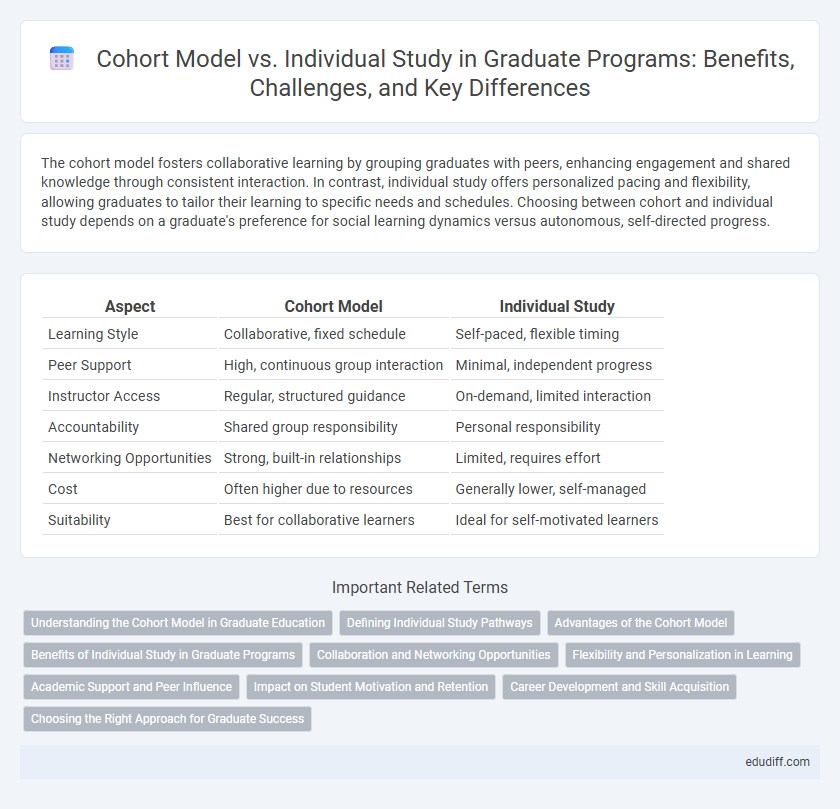The cohort model fosters collaborative learning by grouping graduates with peers, enhancing engagement and shared knowledge through consistent interaction. In contrast, individual study offers personalized pacing and flexibility, allowing graduates to tailor their learning to specific needs and schedules. Choosing between cohort and individual study depends on a graduate's preference for social learning dynamics versus autonomous, self-directed progress.
Table of Comparison
| Aspect | Cohort Model | Individual Study |
|---|---|---|
| Learning Style | Collaborative, fixed schedule | Self-paced, flexible timing |
| Peer Support | High, continuous group interaction | Minimal, independent progress |
| Instructor Access | Regular, structured guidance | On-demand, limited interaction |
| Accountability | Shared group responsibility | Personal responsibility |
| Networking Opportunities | Strong, built-in relationships | Limited, requires effort |
| Cost | Often higher due to resources | Generally lower, self-managed |
| Suitability | Best for collaborative learners | Ideal for self-motivated learners |
Understanding the Cohort Model in Graduate Education
The cohort model in graduate education emphasizes collaborative learning by grouping students who progress through a program together, fostering shared experiences and peer support. This approach enhances engagement and accountability compared to individual study, where learners work independently and self-direct their pace. Research shows cohorts improve retention rates and deepen critical thinking through continuous interaction and collective problem-solving.
Defining Individual Study Pathways
Defining individual study pathways within graduate programs emphasizes personalized learning objectives, allowing students to tailor coursework and research projects to their specific academic and career goals. Unlike the cohort model, which follows a standardized curriculum designed for group progression, individual study prioritizes flexibility and self-directed learning, fostering deeper specialization and autonomy. Integration of mentorship and adaptive assessment methods further enhances the effectiveness of individualized pathways, promoting graduate student success and innovation.
Advantages of the Cohort Model
The cohort model fosters collaborative learning and peer support, enhancing critical thinking and problem-solving skills through shared experiences. Graduates benefit from structured timelines and accountability, which improve motivation and course completion rates. Networking opportunities within the cohort build professional connections that can accelerate career advancement post-graduation.
Benefits of Individual Study in Graduate Programs
Individual study in graduate programs offers customized learning experiences that align with specific academic and professional goals, enhancing deeper subject mastery. It fosters independent critical thinking and research skills essential for scholarly success and innovation. Autonomy in pacing and resource selection allows graduate students to optimize productivity and adapt studies to their unique needs and career objectives.
Collaboration and Networking Opportunities
The cohort model fosters collaboration and networking by grouping graduate students together in structured, interactive learning environments, enabling peer support and diverse perspectives. Individual study offers limited opportunities for building professional connections, as it emphasizes self-paced learning without consistent group interaction. Graduate programs that use cohort models often report higher student engagement and stronger professional networks compared to those relying on solitary study methods.
Flexibility and Personalization in Learning
The Cohort Model fosters collaboration and structured pacing, ensuring consistent peer interaction and shared deadlines, which enhances accountability but may limit scheduling flexibility. Individual Study emphasizes personalized pacing and tailored content, allowing learners to adapt their study times and focus areas according to their unique preferences and needs. Flexibility in Individual Study supports diverse learning styles, while the Cohort Model provides a community-based framework promoting collective progress.
Academic Support and Peer Influence
The Cohort Model enhances academic support through structured collaboration and shared learning experiences, fostering strong peer networks that improve motivation and engagement. Individual Study offers personalized pacing and focused attention but may lack the dynamic peer influence that strengthens problem-solving and critical thinking skills. Research indicates students in cohort programs report higher satisfaction and academic success due to consistent peer interaction and collective accountability.
Impact on Student Motivation and Retention
The cohort model fosters a strong sense of community and accountability, which significantly boosts student motivation and retention by enabling peer support and collaborative learning. In contrast, individual study often lacks social engagement, leading to decreased motivation and higher dropout rates due to isolation. Research from the National Center for Education Statistics reveals that cohort-based programs have a 20% higher retention rate compared to individual study approaches in graduate education.
Career Development and Skill Acquisition
The cohort model fosters peer collaboration and networking, accelerating career development through shared experiences and collective problem-solving. Individual study offers personalized skill acquisition tailored to specific career goals, allowing flexibility and in-depth focus on specialized areas. Combining both approaches maximizes professional growth by balancing structured group interaction with customized learning paths.
Choosing the Right Approach for Graduate Success
Graduate students often face the decision between the cohort model and individual study when planning their academic journey. The cohort model offers structured peer support, collaborative learning, and enhanced networking opportunities crucial for research and professional growth. Individual study provides flexibility, personalized pacing, and the ability to focus deeply on specific interests, making it ideal for self-motivated students seeking tailored academic experiences.
Cohort Model vs Individual Study Infographic

 edudiff.com
edudiff.com